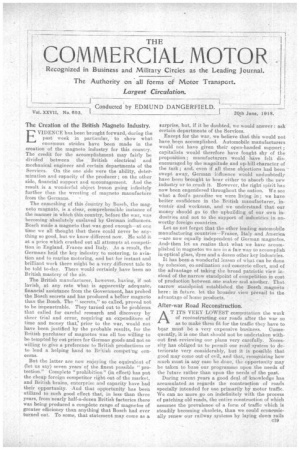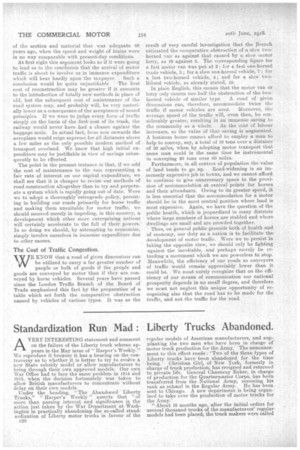The Creation of the British Magneto Industry.
Page 1

Page 2

If you've noticed an error in this article please click here to report it so we can fix it.
EVIDENCE has.been brought forward, during the past week in particular, to shoW what enormous strides have been made in the creation of the magneto industry for this country. The credit for the accomplishment may fairly be divided between the .' British electrical and mechanical engineer and certain departments of the Services. On the one side were the ability, determination and capacity of the producer ; on the other side, financial support and encouragement. And the result is a wonderful object lesson going infinitely further than the wresting of magneto manufacture from the Germans.
The enmeshing of this Country by Bosch, the magneto magnate, is a clear, comprehensible instance of the manner in which this country, before the war, was becoming absolutely enslaved by German influences. Bosch made a magneto that was good enough—at one time we all thought that. there could never be anything so good, but we know different now. He sold it at a: price which crushed out all attempts at competition in England, France and Italy. . As a result, the Germans held the. key industry to motoring, to aviation and to marine motoring, and but for instant and brilliant work there Might be a very different tale to be told to-day. There would certainly have been no British mastery of the air.
The British manufacturer, however, having, if not lavish, at any rate what is apparently adequate, financial assistance from the Government, has. probed the Bosch secrets and has produced a befter magneto than the Bosch. The " secrets," so called, proved not to be impenetrable. They turned out to be problems that called for careful research and discovery by sheer trial and error, requiring an expenditure of time and money that,' prior to the War, would not have been justified by the probable results, for the British purchaser of magnetos was all too willing to be tempted by cut prices for German goods and not so willing to give a. preference to British productions or to lend a helping hand to British compet'ng concerns.
But the latter are now enjoying the equivalent of (let us say) seven years of the finest possible "protection." Complete "prohibition" (in effect) has put the cheap foreign competitor right out of the market, and British brains, enterprise and capacity have had their opportunity. And that opportunity has been utilized to such good effect that, in less than three years, from nearly half-a-dozen British factories there was being produced a. complete range of magnetos of greater efficiency than anything that Bosch had ever turned out. To some, that statement may come as a surprise, but, if it be doubted, we would answer : ask certain departments of the Services.
Except for the war, we believe that this would not have been accomplished. Automobile manufacturers would not have given their open-handed support ; capitalists would therefore have fought shy of the proposition ; manufacturers would have felt disencouraged by the magnitude and up-hill character of the task ; and, even if all these objections had been swept away, German influence would undoubtedly have been brought to bear either to absorb the new industry or tosrush it. However, the right spirit has now been engendered-throughout the nation. We see what a fool's paradise we were living in ; we ha.ve better confidence in the British manufacturer, inventOr and workman, and we understand that our money should go to the upbuilding of our own industries and not to the support of industries in unworthy foreign countries.
Let us not. forget that the other leading automobile manufacturing countries—France, Italy and America —are now equally independent of German magnetos. Andathen let us realize that what we have accomplished in magnetos we are in a fair way to accomplish in optical glass, 'dyes and a dozen other key industries.
It has been .a wonderful lesson of what can be done by cohesion, co-ordination and concreteeffort, and of • the advantage of taking the broad patriotic view instead of the narrow standpoint of competition in cost of production between one maker and another. That narrow standpoint established the Bosch magneto here : in future. let the broader view prevail to the advantage of home products. '
After-war Road Reconstruction.
AT ITS VERY LOWEST computation the work of reconstructing our roads after the war so as to make them fit for the traffic they have to bear must be a very expensive business. Consequently, it is one that should not be undertaken without first reviewing our plans very carefully., Necessity has obliged us to permit our road system to deteriorate very considerably, but it is possible that good may come out of evil, and that, recognizing how much must in any case be done, the opportunity may be taken to base our programme upon the needs of the tuture rather than upon the needs of the past.
During recent years a good deal of knowledge has accumulated as regards the construction of roads specially intended for use primarily by motor traffic. We can no more go on indefinitely with the process of patching old roads, the entire construction of which assumes the prevalence of a form of traffic which is steadily becoming obsolete, than we could economically renew our railway systems by laying down rails of the section and material that was adequate 80 years ago, when the speed and weight of trains were in no way comparable with present-day conditions.
At first sight this argument looks as if it were going to lead us to the conclusion that the arrival of motor traffic is about to involve us in immense expenditure which will bear hardly upon the taxpayer, Such a
conclusion would be quite unjustifiable The first cost of reconstruction may be greater if it amounts to the introduction of totally new methods in place of old, but the subsequent cost of maintenance of the road system may, and probably will, be very materially lower as a consequence of the acceptance of sound principles. If we were to judge every form a traffic simply on the basis of the first cost of its track, the railway would never have had a chance against the baggage mule. In actual fact, from now .onwards the aeroplane would reign supreme for all 'distances above a few miles as the only possible Modern method of transport overland. We know that high initial expenditure may be justifiable in view of savings subsequently to be effected.
The point in the present instance is that, if we add
• the cost of maintenance to the sum representing a fair rate of interest on our capital expenditure, we shall see that it is cheaper to revise our methods of road construction altogether than to try and perpetuate a system which is rapidly going out of date. Were we to adopt a thoroughly-retrograde policy, persisting in building our roads primarily for horse traffic and making them unsuitable for motor traffic, we should succeed merely in impeding, in this country, a development which other more enterprising nations will certainly accelerate to the full of their powers.' In so doing we should, by attempting to economize, simply involve ourselves in immense expenditure due to other causes.
The Cost of Traffic Congestion.
E KNOW that a road of given dimensions can be utilized to carry a far 'greater number of people or bulk of goods if the ;people and goods are conveyed by motor than if they are conveyed by horse vehicles. Several years have passed since the London Traffic Branch of the Board of Trade emphasized this fact by the preparation of a table which set forth the comparative obstruction caused by vehicles of various types. It was as the
result of very careful investigation that the Branch estimated the comparative obstruction of a slow two horsed van as against that caused by a slow motor
lorry, as .10 against 5. The corresponding figure for a fast motor van was put at 2; for a fast one-horsed
trade vehicle 3; for a slow one-horsed vehicle, 7 ; for a fast two-horsed vehicle, 4; and for a slow twoIfolsed vehicle, as already stated, 10.
In plain English, this means that the motor van or lorry only causes one ,half the obstruction of the two horsed vehicle of similar type A• road of given dimensions can, therefore, accommodate twice the
traffic. if motor vehicles are used. Moreover, the
average speed of the traffic will, even then, be con
siderably greater, resulting in an immense .saving to the community as a whole. As the cost of labour
increases, so the value of that saving is augmented.
A business house cannot afford to employ a man to help to convey, say, a total of 10 tons over a, distance
of 30 miles, when by adopting motor transport that same man could in the same timebe instrumental in conveying 20 tons over 60 miles.
Furthermore, in all centres of population the value of land tends to go up. Road-widening is an im mensely expensive job in towns, and we cannot afford to continue to give unnecessary space to the provision of accommodation at central points for horses and their attendants. Owing to its greater speed, it is less essential that the accommodation for a motor should be in the most central position where land is most expensive. Again, we have the question of the public health, which is jeopardized in many districts where large numbers of horses are stabled and where dwellings are small and are crowded together.
Thus, on general public grounds both of health and of economy, our duty as a nation is to facilitate the
development of motor traffic. Were we to persist in taking the opposite view, we should only be fighting against the inevitable, and perhaps merely be retarding a movement which we are powerless to stop.
Meanwhile, the efficiency of our roads as conveyers of traffic would remain appreciably lower than it could be. We must surely recognize that on the effi ciency of our means of communication our national prosperity depends in no small degree, and therefore we moist not neglect this unique opportunity of recognizing also that the road has to be made for the traffic, and not the traffic for the road.






















